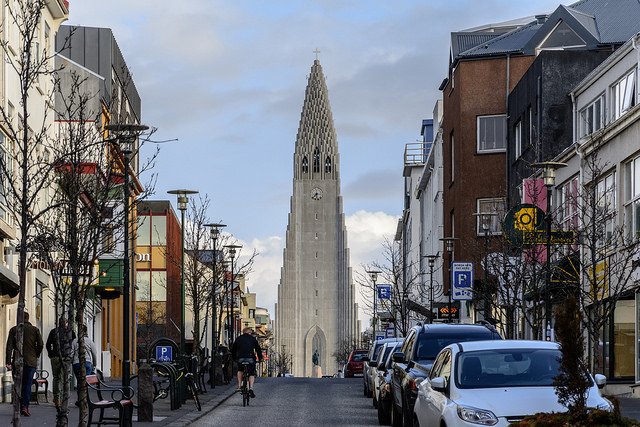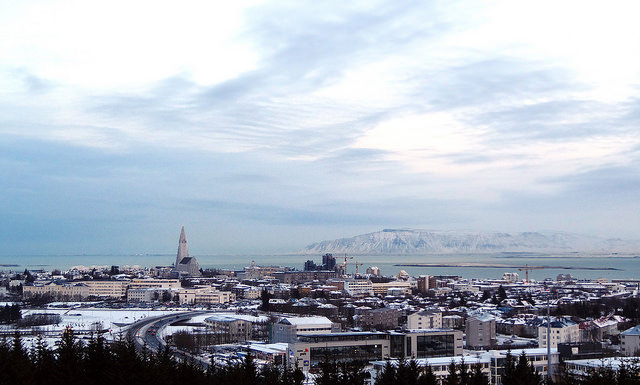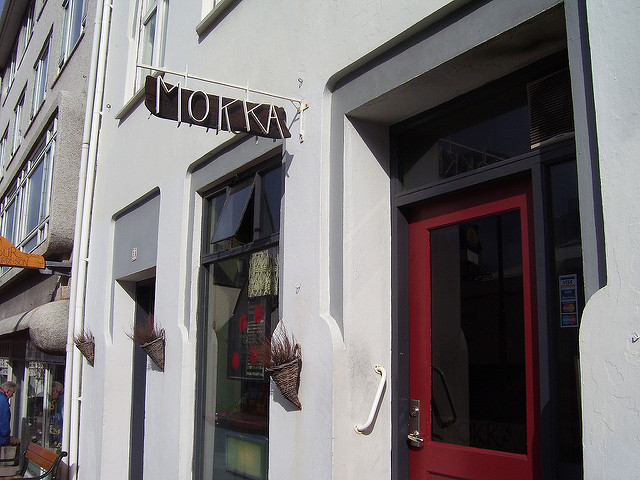Though it’s minuscule in comparison to other European capitals, Reykjavik still manages to offer a coffee house on every corner. It’s easy to think this is to banish the dark days of winter, but the city is home to a fascinating coffee culture that has blossomed for a multitude of reasons.

A colourful view across Reykjavik (Photo: Daniel via Flickr)
I wonder where all the people are as I pound the frigid streets of Reykjavik. It’s a weekday lunchtime, but only a few people pass me, hoods tight around their heads, hands shoved in their pockets. The showroom-style shops look warm and welcoming, but only the shopkeepers cast shadows across the windows, glancing up every now and again to see who’s walking by.
Then something catches my eye – a flurry of movement to my right – and I peer down into the rustic basement of a coffee shop. It’s packed out, people sitting back to back, their hands cradling steaming mugs, their eyes scanning laptops, tablets and books.
It makes sense, really, that everyone dives into the warm confines of a café to pass the time, especially in the dark winter months. I even spend a good few hours sipping a Chai latte and tucking into a deliciously unhealthy waffle on one occasion and a creamy hot chocolate on another. In both instances time seemed to disappear in a vortex of people watching, warming up and rich flavours.
But it’s not just the promise of a warm space that draws crowds of tourists and locals to Reykjavik’s small but stunning coffee houses. In part, it’s the promise of coffee. The average Icelander puts away almost 9kg of coffee beans every year, making them the fourth largest coffee consumers per capita in the entire world. It’s safe to say Reykjavik loves coffee, but I didn’t know how much it adored its caffeine-fuelled drinks until I delved a little deeper.
You would think that in a nation so enamoured with coffee there would be a Starbucks or two dotted around. But thankfully there’s not a single recognisable green logo in sight. In fact big commercial chains are decidedly absent in Iceland, leaving room for the small, independent roasteries and coffee houses to flourish.

The main street in Reykjavik (Photo: dconvertini via Flickr)
And flourish they do! Each and every aromatic coffee house I strolled past was a shabby chic mix of leather sofas, wooden beams, upcycled tables, and vibrant pops of colour. It was as if they had been lovingly designed to match the rich, high-quality flavours of the coffee itself.
But with a coffee shop on practically every corner of the small city (it’s home to around 120,000 people), competition is high. If one place finds itself head and shoulders above the rest, the others have to catch up to keep custom rolling in.
It’s not difficult to get the locals in Reykjavik on board the coffee train, though, because a steaming cup of the black stuff is so intertwined in the city’s culture. In fact, there are designated words for a coffee drunk in the morning (morgunkaffi) and a coffee drunk in the evening (kvoldkaffi).
However, it was the relaxed vibe of the coffee houses that really drew me in. With sofas, plush armchairs, bookcases piled high with local crime novels, and bars stocked with games as well as drinks, they really were a home away from home.
As I sipped my latte and looked around, I noticed that most customers were there by themselves, either reading, writing, or looking busy on their laptops. It didn’t surprise me at all when I learned that Iceland has a higher percentage of writers in its population than any other country in the world – what better way to keep warm on a freezing day than by holeing up in a coffee house and penning the next best-seller?

View across Reykjavik in winter (Photo: AJC via Flickr)
Where to Go for Good Coffee in Reykjavik
With so many options it’s easy to find a free table away from the frigid outside world. But if you’re a self-appointed caffeine-fiend, there are a couple of places you should try to check out.
Kaffitar (Bankastræti 8) is one of the best-loved bastions of coffee in the city. With eight cafes smattered around Reykjavik, it’s the city’s answer to any sort of chain coffee shop. Hiring and training only the best baristas, it serves an eclectic mix of American coffees as well as locally-spun delights.
Like Kaffitar, Kaffismiðja Íslands (Kárastígur 1) is another top dog in Reykjavik’s coffee scene. Boasting a boutique roaster and adjoining café, it’s decked out in vintage design that brings a taste of old-fashioned Iceland to a contemporary scene. As well as churning out great cuppas with an espresso machine, the baristas here also create individual coffees by manually using the in-house aero press (a vacuum coffee maker).
Then there’s Te & Kaffi (Skólavörðustígur 11) which, alongside Kaffitar, leads the specialty coffee movement that’s now so commonplace in Reykjavik. Espresso machines crank out hundreds of expertly-made coffees everyday, from cappuccinos and macchiatos to the nation’s favourite: lattes.

The exterior of Mokka (Photo: Aimee Castenell via Flickr)
The oldest coffee house in the country, Mokka (Skólavörðustígur 3A), sticks to its rich history with a dated, art deco design. After serving the very first espressos to a not very impressed population, Mokka became a hideout for writers, artists and philosophers. You’ll still find a creative crowd propping up the tables here.
Literally translating as “Living Room” in English, Stofan’s (Aðalstræti) comfy sofas are a firm favourite amongst locals. It’s a place for multi-tasking, where customers sip coffee while knitting, writing, or chatting to friends. After hours, the cosy confines turn into a bar serving Irish coffee and a collection of locally-brewed beers.
If you’re just looking for a cup of coffee on the go, Litli Bondabaerinn (Laugavegur 41) is your friend. This charming hole-in-the-wall-style takeaway adds a fresh take on the coffee culture of Reykjavik by giving caffeine lovers a place to pick up a drink on the move.
What Makes the Coffee House Culture in Reykjavik So Special?
As I walked around Reykjavik, I noticed something I hadn’t in other European capitals. There’s a certain small town vibe that makes you feel at home, and that’s replicated inside each and every coffee house on each and every street corner. These aren’t just places that serve a cup of coffee to go, they’re places that provide a home away from home; where patrons can keep warm, get stuff done, and revel in the city’s creative ambiance.